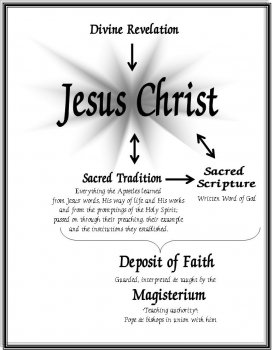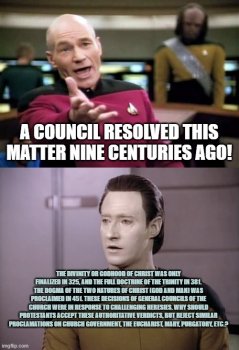The Holy Spirit leads into Truth, AND Supplies wisdom AS PROMISED to whomever desires it single mindedly (James 1:5-8)
But that doesn't rule out the need for an authoritive Church to teach sound doctrine.
The Holy Spirit leads into Truth, AND Supplies wisdom AS PROMISED to whomever desires it single mindedly (
James 1:5-8)
James 1:5-8 doesn't say that. The Bible does not support radical individualism that has undermined Protestant unity since its inception.
(2 Tim. 3:16–17)This passage doesn’t teach formal sufficiency, which excludes a binding, authoritative role for Tradition and Church. Protestants extrapolate onto the text what isn’t there. If we look at the overall context of this passage, we can see that Paul makes reference to oral Tradition three times (cf. 2 Tim. 1:13–14; 2:2; 3:14). And to use an analogy, let’s examine a similar passage:
“And his gifts were that some should be apostles, some prophets, some evangelists, some pastors and teachers, to equip the saints for the work of ministry, for building up the body of Christ, until we all attain to the unity of the faith and of the knowledge of the Son of God, to mature manhood, to the measure of the stature of the fullness of Christ; so that we may no longer be children, tossed to and fro and carried about with every wind of doctrine, by the cunning of men, by their craftiness in deceitful wiles. Rather, speaking the truth in love, we are to grow up in every way into him who is the head, into Christ” (Eph. 4:11–15).
If 2 Timothy 3 proves the sole sufficiency of Scripture, then, by analogy, Ephesians 4 would likewise prove the sufficiency of pastors and teachers for the attainment of Christian perfection. In Ephesians 4, the Christian believer is equipped, built up, brought into unity and mature manhood, and even preserved from doctrinal confusion by means of the teaching function of the Church.
This is a far stronger statement of the perfecting of the saints than 2 Timothy 3, yet it does not even mention Scripture.
So if all non-scriptural elements are excluded in 2 Timothy, then, by analogy, Scripture would logically have to be excluded in Ephesians. It is far more reasonable to recognize that the absence of one or more elements in one passage does not mean that they are nonexistent.
The Church and Scripture are both equally necessary and important for teaching.
In order for Bob to convince me the "me-the-Bible-and-the-Holy-Spirit" mentality is any kind of "rule of faith", then he must demonstrate, through Scripture Alone, that the Church is not necessary for sound teaching. I say it can't be done.





